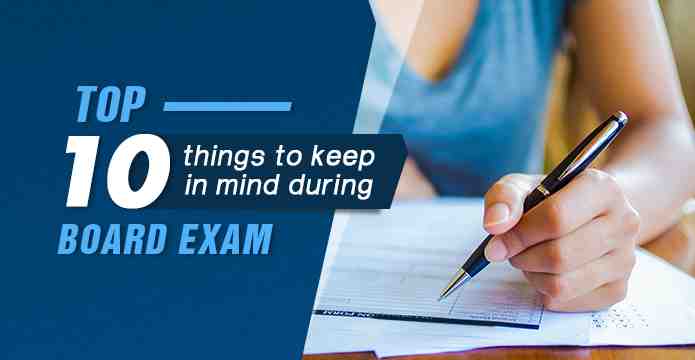Board exam is an inescapable part of a student’s life. For the majority, board exams are like obstacles that bring along extreme anxiety, pressure, and stress. Still, if you follow strategic preparation methods that cover the syllabus entirely you will score outstanding grades in board exams.
2019 CBSE exam date sheet for class 12 and 10 have been released on the official site! The revised and new scoring system has been introduced by the boards, any examinees will experience the needless hype, nervousness, and pressure at the same time. The nerve-wracking late night revisions, the overall feeling of fear following you to your exam hall! Sounds terrifying? Don’t fret!
Here are quick and effective suggestions that contain the “top 10 things to keep in mind during CBSE Board Exams” if you’re appearing for CBSE Board Exams in 2019. Read it to ace the 2019 CBSE Board Exams.
1. Arrive Early at Exam Venue
Be punctual. Arriving early is advantageous as it reduces the hassle of rushing around for finding the designated exam hall and desk. Being on time, you can breathe, maintain the composure, and focus on being positive, and remain less nervous as you see your comrades. On contrary, arriving late will worsen your exam anxiety, eventually hindering your performance in the exam. Thus, punctuality is one of the must-have traits that will help you in the long run.
2. Read the Questions Wisely
Don’t start writing the answers randomly after you get the question paper. The board grants an extra 15 minutes for simply reading the question paper, which is a unique trait of board exams. So, once you get the question, check the pages if they’re proper and if any pages are left unprinted. Read and understand the instructions, marks distribution, and the question format. Careful use of those 15 minutes will clear doubts and recede nervousness.
3. Prioritize and do not follow a specific pattern
By the time you finish reading the questions, you will surely figure out the questions that you’re familiar with and the ones that are less easy. Keeping the instructions and marks distributions in mind, mark the questions that you want to do. While you begin writing, the questions that are easy should be your priority. As board exams have no rules for following the specific pattern, all you have to be specific is about mentioning the correct question number.
4. Be careful while writing your details
contrasting to a large scale, Board Exams demands detailed information for each candidate, unlike what’s asked during the class test and exams held in the school. A board examinee needs to mention the registration number, roll & number, question set number, correct date, etc on the first page of the answer sheet. Thus, you need to be extra careful while mentioning your details so that you need no get into the trouble to correct it later. (doing so may get your board exam candidature canceled)
5. Don’t spend too much time on a single question
If you come across a question that you’re less familiar with or if you cannot recall an answer for a question that you’ve studied, then do not spend much time in it. Rather switch on to another question. You can always come back to the skipped question once you’re done with the easier ones. Spending too much time on a single question will be a waste of time. You can utilize those time for attempting the other sections.
6. Be Presentable
No matter how excellent you’re with the academics, how you present your answer sheet during the board exam matters to a great extent. You need to understand the demand of quality and quantity in the board exams. Make sure your handwriting is good and readable enough. Maintain the proper spacing between the words and lines so that your examiner doesn’t need to make an extra struggle to comprehend to what you’ve written.
7. Use pencils for diagrams & labels
You should carry a pencil, eraser, scale, sharpener while it comes to the subjects that require making diagrams. For example, you can be asked to draw the anatomy of the heart or the nephron. Diagrams should be drawn only with a pencil and the labeling has to be done with the pencil alone and nothing else. The margins, lines, should be drawn using the pencil and scale, not with a pen.
8. Do not decorate the answer sheet
Some students have this misconception of being presentable. They think that covering the answer sheet with multi-colored pens will impress an examiner. However, decorating the answer sheet will never going to get you extra scores. You should always keep in mind that you should only use a blue pen for writing exams. You can use a black pen for writing the headings, sub-headings, and the name, dates, phrases, to expose them as important.
9. Do not leave the exam hall early
For anyone, 3 hours may seem ordinary, but when it comes to boards, the given 3 hours is the most crucial hours of life, because your quality will be assessed on basis of what you write. Yet, some students leave the exam hall early even when they’re finished writing just a few questions. Board exam questions are based on what you’re taught in the class. Thus, a student should try to recollect the solutions in comprehending the questions.
10. Re-check your answer sheet
Be it 15 minutes or 5, if you have finished all the questions, do not rush to get out of the exam hall. Consider the remaining time as a boon and utilize it for revision, who knows you may come across a tiny but important thing to change? Make sure, you save at least 10-15 minutes primarily for revision. Amid the hassle and anxiety, you’re likely to have few categories where changes are required. Thus a thorough revision is required.
We wish you all the best for the 2019 board exams and for your future ahead!
Also Read: How to score highest marks in board exams








